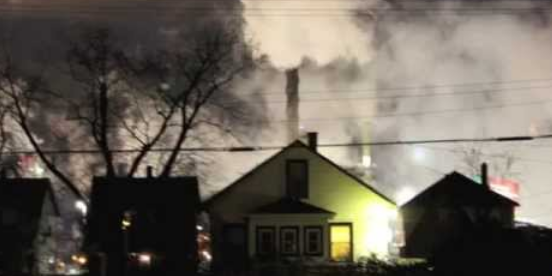Photos: YouTube
Last week, Rep. Ro Khanna, Chair of the Subcommittee on Environment, and Subcommittee Vice Chair Rep. Rashida Tlaib held a field hearing in Detroit, Michigan, to examine the gaps in current laws and regulations that leave frontline communities vulnerable to pollution, and the policy changes necessary to safeguard public health and the environment.
“The reality is that for far too long, vulnerable communities have faced pollution as a compounded problem,” Chair Khanna said in his opening statement. “It’s often that communities don’t have clean drinking water because of lead, and on top of that, they have air pollution. On top of that, they may have pollution from a refinery. All of these things add up and there is a cumulative impact. The reality is that if you’re in Warren, MI, as Rep. Tlaib explained to me this morning, you may not have the impact there. But, if you’re in a poor community or in a Black community, then it’s license to pollute. That’s just wrong. That doesn’t give people dignity.”
“Our current environmental permitting and enforcement systems are sacrificing Black, brown, immigrant, and low-income communities for the profits of corporate polluters, and we have an urgent moral duty to build new systems that put our health and environment first,” Vice Chair Tlaib said in her opening statement. “The number zero should be our target. Zero children with asthma from concentrations of corporate polluters. Zero elders with cancer from breathing air tainted by corporations under toothless consent decrees. Zero neighbors sacrificed. A better world is possible, if we build it.”
The Subcommittee heard testimony from Robert Shobe, a resident of Detroit, Michigan who lives in the Stellantis Impact Zone; Pamela McGhee and Daeya Redding, residents of Detroit, Michigan, who live in the US Ecology Impact Zone; Nicholas Leonard, Executive Director of the Great Lakes Environmental Law Center; Jamesa Johnson Greer, Executive Director of the Michigan Environmental Justice Coalition; Eden Bloom, Public Education and Media Manager of the Detroit People’s Platform; and Dr. Stuart Batterman, Professor of Environmental Health Sciences at the University of Michigan School of Public Health.
Witnesses described the realities of living in “sacrifice zones” and how corporate polluters are putting profits over their health and the environment.
- In response to a question from Chair Khanna on how a community’s racial makeup impacts where corporations choose to place pollution sites, Ms. Redding replied: “Race has a big part of it. Like I said, we’re in the sacrifice zone right now. We are being sacrificed to help big corporate companies profit. It’s a big racial issue because this is not happening in any other community that is a different race than ours.”
- In her testimony, Ms. McGhee said: “My family and I have been around here most of our lives and we all have suffered really badly from asthma living here. When my oldest daughter Jonique was coming home from school, then 16 years old, she had a terrible asthma attack at the bus stop nearby and someone took her to a hospital. That day the incinerator was going strong. Jonique is in her 40’s now and still has bad asthma attacks, infertility issues, and fibroid problems. The city and state regulatory agencies have done little to address our continued health concerns.”
Members and witnesses discussed how the Environmental Protection Agency’s permitting processes fail to consider cumulative impacts on communities and how enforcement of permit violations is often slow and lacking transparency and public input.
- In her testimony, Ms. Johnson-Greer stated that “cumulative health and environmental impacts [should be] incorporated into permitting processes, [so] that communities already overburdened by pollution—just as we heard today—will not be inundated with more pollution and that applications for permits can be denied in such communities. There’s examples of this type of legislation that has been enacted in New Jersey, for example, that could be a good model.”
- In response to a question from Rep. Debbie Dingell, Ms. Redding implored EPA Region 5 Administrator Debra Shore: “You have got to help. You have got to stop this. Our neighborhood specifically is so poor. Anyone coming into our neighborhood cannot believe it smells like it does. I had so many bad headaches.”
Members and experts highlighted reforms necessary to protect frontline communities from pollution and prevent corporate polluters from incorporating permit violation penalties into their bottom lines as the cost of doing business.
- In her opening statement, Vice Chair Tlaib said: “The neighborhood surrounding the Stellantis plant is 94% Black. In order to receive their air permit to pollute more in a Black neighborhood – in our back yard – Stellantis agreed to decrease its pollution from its Warren plant, which is about 66% white. Everyone deserves the right to breathe clean air. But, it’s important to understand they chose our community to pollute more.”
- In response to a question from Chair Khanna regarding the possible passage of a fossil fuel wish list proposal rumored to be under consideration, Mr. Leonard said Congress should oppose the bill because those so-called permitting provisions, “would mean that we’re going backwards in terms of addressing environmental racism and essentially not just failing to address that legacy issue…of environmental injustice, but essentially turbo-charging environmental injustice and making it actively worse for communities.”
- In her testimony, Ms. Greer stated: “We need early and meaningful community engagement through the National Environmental Policy Act (NEPA). The very notion that while environmental justice communities are fighting for their survival of the ongoing climate crisis, a pathway is being created by industry and those who support them to fast-track large projects without considerations of alternatives that may be more responsive to the climate crises. Proposed changes to NEPA will likely limit public input, public accountability, government accountability and public access to the courts on the country’s largest infrastructure projects where it is necessary to fully consider community and environmental impacts.”












